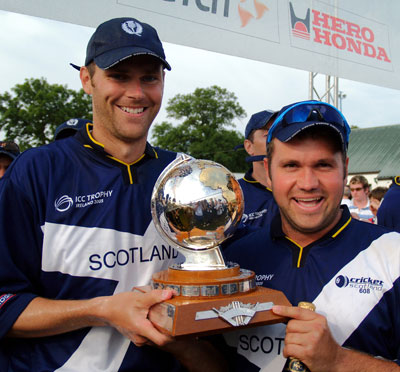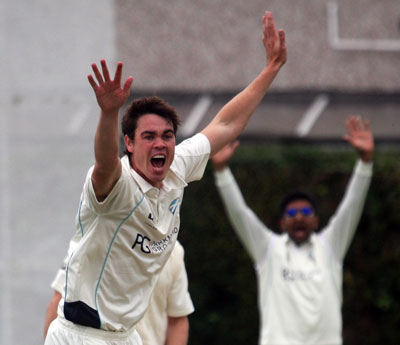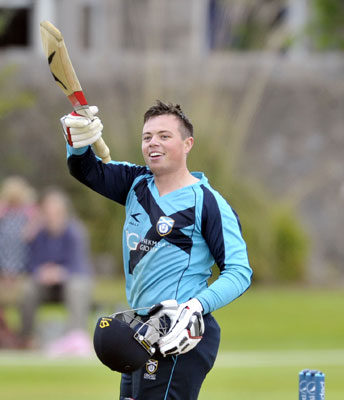 IN THE next two days we will find out whether Scotland have ended a four-year exile from major tournaments and qualified for the World Twenty20 finals in Bangladesh next year.
IN THE next two days we will find out whether Scotland have ended a four-year exile from major tournaments and qualified for the World Twenty20 finals in Bangladesh next year.
Up to 80 overs remain to be bowled before the unnecessary third phase of the qualifying tournament begins, but enough evidence was forthcoming from the seven matches of the first phase to make several conclusions about where in their development this Scotland team is situated.
They travelled to the United Arab Emirates with a captain, Kyle Coetzer, who was happy to declare that he had never been involved with a stronger Scotland squad. If Craig Wright spat his coffee over his Weetabix when he read this, the most successful Scotland captain to date had done some reconnaissance by the time he got in touch via Twitter to try to qualify what Coetzer said.
Namely, that this squad has the potential to be better than the one that was king among associate nations in the mid-2000s. As Wright acknowledged, they are not there yet, a point that was rammed down Coetzer's throat when they lost by significant margins to Bermuda and Afghanistan in matchdays one and two and then by a monstrous margin to Kenya in matchday four.
Today, CricketEurope attempts to pinpoint the status of Coetzer's team - without, admittedly, having seen every ball of their endeavours in the Gulf - by using the captain's confident contention as a yardstick.
1) Scotland are not as good as they were between 2003 and 2007.
That team went into every match against a fellow associate or affiliate nation with no scars, no psychological impediment and no self-doubt. They set the tone of every game, whatever the format, and grasped the initiative from the start, whether it was through a damaging early burst by Paul Hoffmann, Dougie Brown and John Blain or a solid platform of runs from Ryan Watson and Fraser Watts.
 The Wright/Smith combination was the ruination of many middle orders and Majid Haq beguiled batsmen in tandem with Glenn Rogers, Ross Lyons or Gregor Maiden. If the first phase of attack was repelled there were people like Gavin Hamilton, Ian Stanger and Neil McCallum around to pick up the slack.
The Wright/Smith combination was the ruination of many middle orders and Majid Haq beguiled batsmen in tandem with Glenn Rogers, Ross Lyons or Gregor Maiden. If the first phase of attack was repelled there were people like Gavin Hamilton, Ian Stanger and Neil McCallum around to pick up the slack.
Today, Scotland have what appears to be an incurable inability to impose themselves on Ireland or Afghanistan, with the result that these two teams are undisputed rulers of the associate kingdom and Scotland sit somewhere in middle nobility.
It's hard to get over psychological barriers like that, because the dominant force is just as strong in that situation as the suppressed force is weak. It must be noted that the one comparison between the two eras is that Scotland are utter dummies when it comes to the run chase. Put pressure on them to score quickly without losing their wickets and the carnage is usually too grotesque to behold.
They batted second in their first four games at the T20 qualifiers and failed three times - the only time they succeeded was in a patient, pedestrian effort to overhaul a modest target set by Nepal. And what happened when they batted first in the three remaining games against PNG, Netherlands and Denmark? Hey presto, Scotland won.
There are occasional exceptions to the rule: Wright and Smith famously clobbered their way to an improbable win over Ireland in Nairobi in early 2007, and a majestic innings by Coetzer paved the way for Richie Berrington to subdue the same opposition in Edinburgh in 2011.
But this was always and remains to this day the litmus test for any Scotland coach, Paul Collingwood included. Teach Scotland how to bat under pressure and yes, Kyle, this really could turn out to be the best team yet.
2) Scotland have not yet bedded in as a team.
The blessing of having so many players involved in full-time professional cricket is countered by the difficulty in bringing them together during the summer. This was the unmissable subtext of the battering Australia's handed out in September. It doesn't matter how good the individuals are, only a team can win matches.
 And forget that cliche about Twenty20 games being won single-handedly: only an incredibly special opener like Chris Gayle or Brendon McCullum really has the power to consign the other 21 players involved in a match to bit-part roles.
And forget that cliche about Twenty20 games being won single-handedly: only an incredibly special opener like Chris Gayle or Brendon McCullum really has the power to consign the other 21 players involved in a match to bit-part roles.
The beauty of the Scotland team that marched to seven straight victories in the ICC Trophy in Ireland, and also won the first Intercontinental Cup and qualified for everything worth qualifying for, was that they intimately knew each other's strengths and weaknesses.
Sure, Rob Taylor, Iain Wardlaw, Safyaan Sharif and David Murphy offer something that the 2005 vintage didn't, but until they can fire in tandem, Scotland will not be regarded as a force to be feared.
The rotation of roles in the UAE screams of a coach still not knowing his best XI, and this is understandable because this is the first time they have been exposed to the continuity of sustained competition.
Ireland established a winning template in 2006/7, as their golden generation came together, and they have barely shifted from it since. Winning games has become second nature to them, even on days when they don't perform.
Again, we are left looking at the crux of the challenge facing Pete Steindl and the two former greats of the playing arena beside him, Collingwood and Wright. Regardless of what happens this week, they must turn Scotland into a well-oiled machine by the time they get to New Zealand in the new year, and not only qualify for the last of the era of inclusive World Cups but make an impression on the elite when they get there. Otherwise long-term obscurity beckons.
3) The potential is there.
 For a number of years it has been fairly obvious that if Phil Simmons was allowed to pick anyone from Scotland for his Ireland team, even Coetzer and Haq would struggle to dislodge the players who have been delivering for the Blarney Army almost every time the call has come.
For a number of years it has been fairly obvious that if Phil Simmons was allowed to pick anyone from Scotland for his Ireland team, even Coetzer and Haq would struggle to dislodge the players who have been delivering for the Blarney Army almost every time the call has come.
Actually, only bowlers with a bit of pace like Iain Wardlaw and Safyaan Sharif would be seen by Simmons as trump cards that could strengthen his hand.
The picture is changing, though. Matt Machan has done enough for Sussex and Scotland to permit him an extended stay at No 3.
Calum MacLeod, who Coetzer revealed has been the subject of county interest for his Twenty20 prowess alone, has a terrific head on his shoulders and could yet go far in the game. The captain himself is a fine player and if Richie Berrington would only value his wicket more, it would be a top four capable of steering 50-over games as well as 20-over games Scotland's way.
Sharif looks like a real gem with bat and ball, and he should become a mainstay of the team once the spurious Neil Carter experiment comes to an end. Murphy and Taylor are also surely good enough to also thrive once they establish what their roles are in this unit.
4) Scotland still rely too heavily on Majid Haq.
It is time to recognise the off-spinner as Scotland's greatest-ever bowler and, as I put it rather obsequiously on Twitter last week, a national treasure. I laughed out loud when Haq said the comment had made him blush, but then retweeted it anyway. No apologies.
He has been spinning and weaving miracles for over a decade now, and has even brought respectability to Scottish cricket on dark days. I can't remember the national side winning a game when he took a lot of tap. Too many top players have fallen foul of his artistry for it to be misread as a stop-start phenomenon, and his influence on games has been profound across all formats.
In this, the third World T20 Qualifier at which Scotland have lost more games than they should have, Haq has taken 10 wickets at a cost of 138 runs in 27 overs. That's 5.11 runs an over and only one bowler, Samiullah Shenwari of Afghanistan, boasts a better economy rate among bowlers with 10 or more wickets.
At this juncture Gordon Goudie has taken more wickets (12) but at a dramatically greater cost (7.81 per over).
Look at Ireland's stats and Paul Stirling has the exact same number of wickets and economy rate as Haq. And Ireland know that when it comes to parsimony, Trent Johnston and George Dockrell will never be far behind.
Haq's influence needs to be matched by at least one strike bowler and one other, with Taylor looking most likely, if Scotland are to emerge in 2014 and dazzle us like bright new lights.
Follow @JonCoates on Twitter